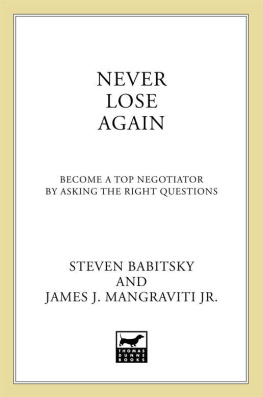Deepak Malhotra - Navigating the Impossible: How to Break Deadlocks and Resolve Ugly Conflicts (without Money or Muscle)
Here you can read online Deepak Malhotra - Navigating the Impossible: How to Break Deadlocks and Resolve Ugly Conflicts (without Money or Muscle) full text of the book (entire story) in english for free. Download pdf and epub, get meaning, cover and reviews about this ebook. year: 2018, publisher: Berrett-Koehler Publishers, genre: Politics. Description of the work, (preface) as well as reviews are available. Best literature library LitArk.com created for fans of good reading and offers a wide selection of genres:
Romance novel
Science fiction
Adventure
Detective
Science
History
Home and family
Prose
Art
Politics
Computer
Non-fiction
Religion
Business
Children
Humor
Choose a favorite category and find really read worthwhile books. Enjoy immersion in the world of imagination, feel the emotions of the characters or learn something new for yourself, make an fascinating discovery.

- Book:Navigating the Impossible: How to Break Deadlocks and Resolve Ugly Conflicts (without Money or Muscle)
- Author:
- Publisher:Berrett-Koehler Publishers
- Genre:
- Year:2018
- Rating:4 / 5
- Favourites:Add to favourites
- Your mark:
Navigating the Impossible: How to Break Deadlocks and Resolve Ugly Conflicts (without Money or Muscle): summary, description and annotation
We offer to read an annotation, description, summary or preface (depends on what the author of the book "Navigating the Impossible: How to Break Deadlocks and Resolve Ugly Conflicts (without Money or Muscle)" wrote himself). If you haven't found the necessary information about the book — write in the comments, we will try to find it.
Some negotiations are easy. Others are more difficult. And then there are situations that seem completely hopeless. Conflict is escalating, people are getting aggressive, and no one is willing to back down. And to top it off, you have little power or other resources to work with. Harvard professor and negotiation adviser Deepak Malhotra shows how to defuse even the most potentially explosive situations and to find success when things seem impossible.
Malhotra identifies three broad approaches for breaking deadlocks and resolving conflicts, and draws out scores of actionable lessons using behind-the-scenes stories of fascinating real-life negotiations, including drafting of the US Constitution, resolving the Cuban Missile Crisis, ending bitter disputes in the NFL and NHL, and beating the odds in complex business situations. But he also shows how these same principles and tactics can be applied in everyday life, whether you are making corporate deals, negotiating job offers, resolving business disputes, tackling obstacles in personal relationships, or even negotiating with children.
As Malhotra reminds us, regardless of the context or which issues are on the table, negotiation is always, fundamentally, about human interaction. No matter how high the stakes or how protracted the dispute, the object of negotiation is to engage with other human beings in a way that leads to better understandings and agreements. The principles and strategies in this book will help you do this more effectively in every situation.
This book is magic for any deal maker. Daniel H. Pink, New York Times-bestselling author
Deepak Malhotra: author's other books
Who wrote Navigating the Impossible: How to Break Deadlocks and Resolve Ugly Conflicts (without Money or Muscle)? Find out the surname, the name of the author of the book and a list of all author's works by series.








